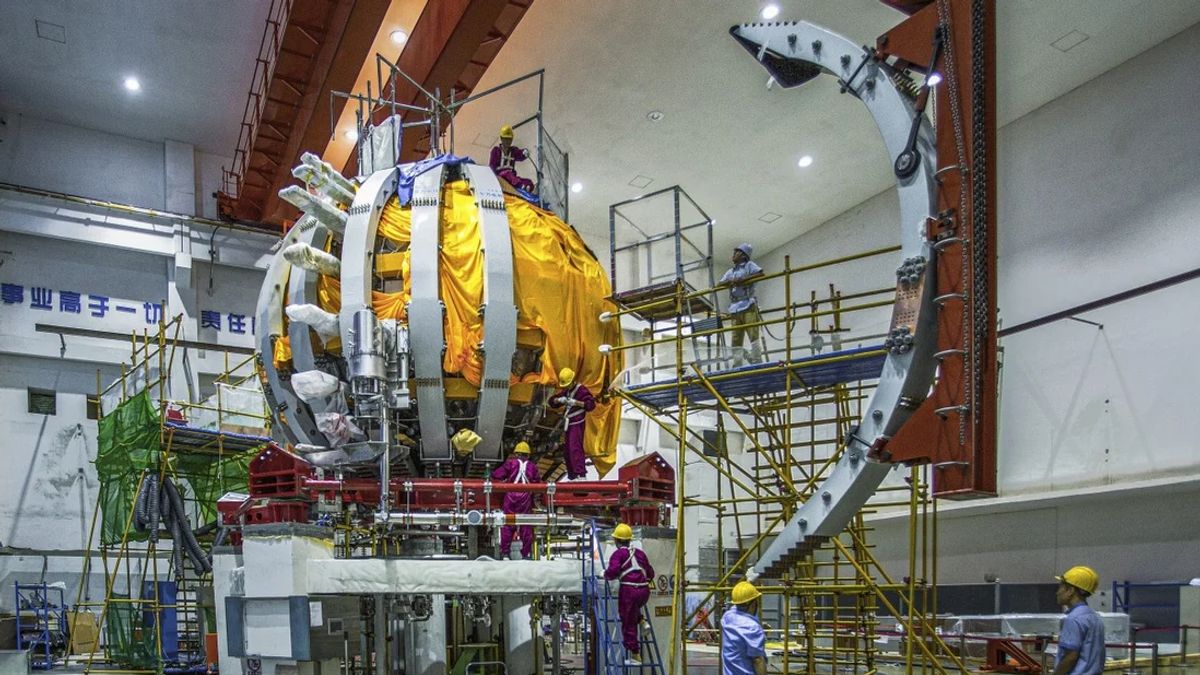JAKARTA - What can't China do? ranging from household appliances to imitation devices, the bamboo curtain country has been made. Even recently, China succeeded in turning on artificial solar installations.
The solar installation made in China is claimed to be capable of producing 10 times hotter energy than the core of the sun itself. The solar made in China is operated in an installation called the Tokamak HL-2M which is capable of producing heat energy reaching 150 million degrees Celsius (270 million Fahrenheit).
Launching from the South China Morning Post page, this artificial sun was made to get a clean energy source that is environmentally friendly. Because, so far, modern life has relied on carbon energy which causes pollution.
Of course China's success in making clean energy installations through nuclear fusion reactions attracted the attention of many parties. According to the China National Nuclear Corporation (CNNC), the ability of the Tokamak HL-2M installation is capable of producing heat energy.
The ability to produce ultra high temperatures is very important for fusion process research. Where, this installation can replicate the way the Sun produces energy using hydrogen gas and deuterium as fuel.
So far, France is also developing an International Termonuclear Experimental (ITER) reactor designed to operate at temperatures up to 150 million degrees Celsius (270 million Fahrenheit).
The chief engineer of the CNNC Fusion Science Institute, Yang Qingwei, said the Chinese-made sun was known to be capable of achieving magnetic plasma confinement of up to 10 seconds.
The new facility owned by Matahari made in China or called the Ecperimental Advance Superconducting Tokamak (EAST) also has three times the plasma volume and six times the plasma current intensity compared to HL-2A.
In fact, the EAST project was said to be one of the important pillar projects for ITER. China, which is a member of ITER together with the United States (US), India, Japan, Russia and South Korea, has a goal to develop fusion technology.
The reason is that China plans to build an experimental reactor as early as next year, build an industrial prototype in 2035 and begin commercial use on a large scale in 2050.

It is known, the EAST reactor works by combining two hydrogen nuclei. When these chemical elements combine, they create tremendous heat energy. This process is known as nuclear fusion and is different from ordinary nuclear reactors, which involve fission or splitting of atomic nuclei.
On the other hand, scientists believe that this extremely hot temperature is only the minimum required, even if they intend to create a standalone nuclear reactor.
However, there is still a next step for the team of scientists to be able to realize the cutting-edge energy source they want. China used a 20 tonne superconducting magnetic buffer structure assembled in France to make this project a reality.
For the record, the biggest challenge of the EAST reactor is to survive the extraordinary heat for a long time to be able to create a practical energy source.
If nuclear fusion could be harnessed using low energy methods, it could allow for the creation of unlimited clean energy. And, if successful, China could be of great assistance to ITER.
Other Country InterestAlthough it is said to be made in China, this artificial sun is a big project that involves scientists from 35 countries. To realize this project, China is working with a number of countries, namely the United States (US), the European Union, Russia, Japan, India and South Korea.
It should be noted, this artificial Sun from China is not shaped like the Sun, but is in the form of the largest and most sophisticated nuclear experimental research in the world. The plan is that the sun made in China can be used commercially in 2050.
Not satisfied with making the Sun, China also plans to build an illuminated satellite or artificial moon, aka the artificial moon.
Now, the project has been developed by the Chengdu Aerospace Science and Technology Microelectronics System Research Institute, and testing of this satellite has started many years ago.
China argues that the artificial Moon is designed to illuminate cities, which can replace conventional lighting that typically uses street lights.
Meanwhile, the head of the Chengdu Aerospace Science Research Institute, Wu Chunfeng claims the artificial moon will produce light eight times brighter than the Moon in the universe.
Chunfeng stated, the fake moon will be able to illuminate an area of 10-80 kilometers. Meanwhile, the precise range of lighting can be controlled within a few tens of meters. However, it is not certain when this fake Moon will be launched, reportedly claimed in 2021.
The English, Chinese, Japanese, Arabic, and French versions are automatically generated by the AI. So there may still be inaccuracies in translating, please always see Indonesian as our main language. (system supported by DigitalSiber.id)













